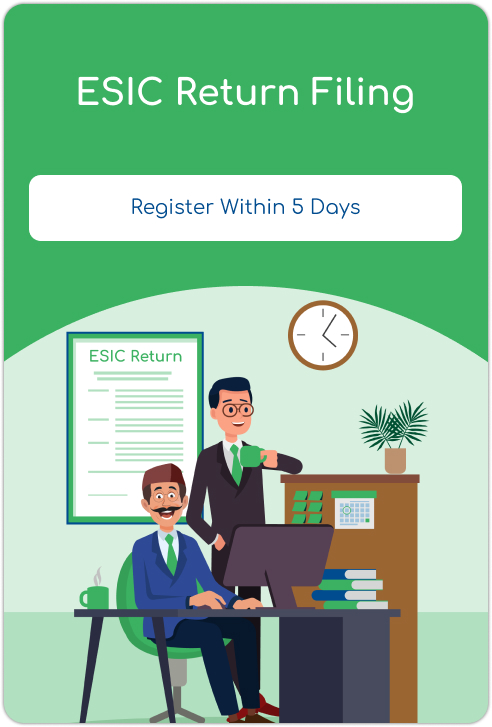
ESIC Return Filing
74 customers
What will you get?
- Monthly ESI
Contribution Compliance - Registration of
New Employee - Exit process
What do we Require?
INR 8275 Taxes As Applicable




Introduction
Introducing ESIC Return Filing – the essential process for businesses to comply with the regulations set forth by the Employee State Insurance Corporation (ESIC). ESIC return filing is a crucial aspect of managing employee welfare, ensuring that necessary contributions are made towards their health and social security benefits. As mandated by law, employers must regularly file ESIC returns to report employee earnings, deductions, and contributions to the ESIC fund. These returns provide vital financial information and ensure that employees receive the benefits they are entitled to under the ESIC scheme. Navigating the complexities of ESIC return filing can be challenging, with strict deadlines and intricate documentation requirements. However, it is essential for businesses to prioritize compliance to avoid penalties and uphold their commitment to employee welfare. By accurately reporting employee data and contributions, businesses contribute to the stability and sustainability of the ESIC fund, benefiting both employees and the broader community. ProMunim’s ESIC Return Filing service is designed to simplify this process, offering businesses a streamlined and efficient way to meet their compliance obligations. With automated data collection, customized reporting tools, and real-time monitoring capabilities, our solution empowers businesses to stay compliant with ease. By leveraging our expertise and technology, businesses can navigate ESIC return filing with confidence, ensuring the well-being of their employees while minimizing administrative burden and risk.
Advantages of Employee State Insurance Corporation (ESIC) returns:
- Employee Welfare:ESIC returns ensure that employees have access to essential benefits such as medical care, sickness benefits, maternity benefits, and disability benefits. By contributing to the ESIC fund and filing returns accurately, employers contribute to the well-being and security of their workforce.
- Legal Compliance:Filing ESIC returns is a legal requirement for employers covered under the ESI Act, 1948. Adhering to ESIC compliance ensures that businesses fulfil their statutory obligations, minimizing the risk of penalties, fines, or legal action for non-compliance.
- Financial Protection:ESIC benefits provide financial protection to employees during times of need, such as illness, maternity, or injury. By filing ESIC returns, employers facilitate the availability of these benefits, offering employees a safety net to mitigate financial hardships.
- Healthcare Access:ESIC returns contribute to the funding of healthcare facilities and services provided by the ESIC. These facilities are available to employees and their dependents, ensuring access to quality medical care and treatment without significant financial burden.
- Employee Retention and Satisfaction:Offering ESIC benefits demonstrates employers' commitment to employee welfare and can contribute to higher levels of employee satisfaction and loyalty. Employees value access to healthcare benefits and financial protection, which can enhance their overall job satisfaction and retention.
- Social Responsibility:Filing ESIC returns reflects a company's commitment to social responsibility and ethical business practices. By supporting employee welfare initiatives through ESIC contributions, businesses demonstrate their dedication to the well-being of their workforce and the broader community.
- Competitive Advantage:Providing ESIC benefits and ensuring compliance with ESIC regulations can enhance a company's reputation as an employer of choice. This can help attract top talent, improve employee morale, and enhance the company's competitive position in the market.
- Form 01:This form is used for registration of factories or establishments under the ESI Act, 1948. Employers need to submit Form 01 to register their business with the ESIC and obtain a unique code number.
- Form 01-A:This form is used for registration of employees under the ESI Act, 1948. Employers need to submit Form 01-A for each employee to register them with the ESIC and enrol them for ESIC benefits.
- Form 3:This form is used for the declaration of contributions. Employers need to submit Form 3 along with the monthly contribution to the ESIC, providing details of the wages paid to employees and the corresponding ESIC contribution.
- Form 5:This form is used for the return of contributions. Employers need to submit Form 5 to the ESIC on a half- yearly basis, providing details of the wages paid to employees and the corresponding ESIC contribution for the six- month period.
- Form 6:This form is used for the return of contributions paid for employees who are drawing less than the prescribed wage limit. Employers need to submit Form 6 to the ESIC along with the monthly contribution for eligible employees.
- Form 7B:This form is used for the return of declaration forms received from employees. Employers need to submit Form 7B to the ESIC along with the monthly contribution, providing details of the declaration forms received from employees.
- Form 12:This form is used for the return of contributions during a contribution period. Employers need to submit Form 12 to the ESIC along with the monthly contribution, providing details of the wages paid to employees and the corresponding ESIC contribution for the specific contribution period.
- Form 37:This form is used for the annual information on factory/establishment. Employers need to submit Form 37 to the ESIC on an annual basis, providing details of the factory or establishment, including address, nature of work, number of employees, etc.
Process for filing PF monthly returns using the service provided by Promunim:
- Data Collection:Once registered, you'll need to provide employee data and relevant payroll information to Promunim. This includes details such as employee names, wages, ESIC contribution amounts, and any other required information for the reporting period.
- Data Verification:Our dedicated team will verify the accuracy of the data provided to ensure compliance with ESIC regulations. Any discrepancies or missing information will be communicated to you for correction and clarification.
- Preparation of Returns:Based on the verified data, Promunim will prepare the ESIC monthly returns on your behalf. This includes filling out the required forms and compiling the necessary documentation for submission to the ESIC.
- Submission of Returns:Once the ESIC returns are prepared, returns will submit to the ESIC electronically on your behalf. This ensures timely submission and compliance with regulatory deadlines.
- Confirmation and Acknowledgment:Promunim will provide confirmation of the successful submission of the ESIC returns and obtain acknowledgment from the ESIC, ensuring that the filing process is complete.
- Compliance Monitoring:Throughout the process, Promunim will monitor compliance with ESIC regulations and provide updates on any changes or updates to reporting requirements. This helps ensure on-going compliance and adherence to regulatory standards.
- Support and Assistance:ProMunim’s team of experts is available to provide support and assistance throughout the ESIC return filing process. Whether you have questions about data requirements, reporting guidelines, or compliance issues, their team is there to help.
Consequences:
- Penalties:Non-compliance with ESIC return filing obligations can result in penalties levied by the Employee State Insurance Corporation (ESIC). The penalties may vary depending on factors such as the duration of non-compliance, the number of employees affected, and the seriousness of the violation.
- Financial Loss:Employers may incur financial losses due to penalties imposed for non-compliance with ESIC return filing requirements. These penalties can accumulate over time, leading to substantial fines that can impact the financial stability of the business.
- Legal Action:Continued non-compliance with ESIC return filing obligations may result in legal action by the ESIC. This can include legal notices, fines, and even prosecution in severe cases. Employers may be required to appear before legal authorities and face legal consequences for their failure to comply with regulatory requirements.
- Disruption of Benefits:Employees may be denied access to essential benefits and services provided under the ESIC scheme if their employers fail to file returns. This can impact employee morale, satisfaction, and overall well-being, leading to dissatisfaction and potential labour disputes.
- Reputation Damage:Non-compliance with ESIC return filing obligations can damage the reputation and credibility of the business. It may erode trust among employees, investors, customers, and other stakeholders, leading to negative publicity and loss of goodwill.
- Operational Disruption:Legal proceedings and penalties resulting from non-compliance with ESIC return filing requirements can disrupt business operations, diverting resources and attention away from core activities. This can hinder growth, productivity, and overall business performance.
- Ineligibility for Government Contracts:Businesses that have a history of non-compliance with regulatory requirements, including ESIC return filing obligations, may become ineligible for government contracts and tenders. This can limit business opportunities and growth prospects.

